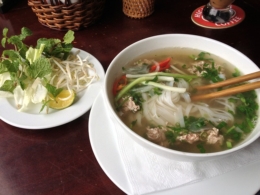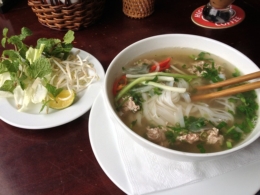What is the relationship between spelling and pronunciation?
I recently saw an article about the pronunciation of the word PHO, a popular Vietnamese noodle soup. Based on the spelling, most Canadians and Americans tend to pronounce the word as FOE (rhyming with the word NO.) Well, according to the article, the true pronunciation is FUH. (which doesn’t rhyme with any word in English but the vowel sound is the same as that in the word PUT.)
Here’s Why Pho Is Really Pronounced ‘Fuh’
 Okay, I thought. It makes sense that the letter O is pronounced differently in Vietnamese.
Okay, I thought. It makes sense that the letter O is pronounced differently in Vietnamese.
Then I received another article – actually the same article but with a slightly different title.
Why Pho is Actually Pronounced ‘Fur’
Okay, now why would this be? I checked and saw, as I thought, that the second publication was Australian and the first was American. Since most Australian accents, similar to British, don’t pronounce a hard R as we do in North America, they needed to reflect this in the spelling. So FUH and FUR can sound the same depending upon your accent.
Isn’t English crazy enough as it is that we have to factor in so many variations. First, a crazy shift in vowels that happened back just after the printing press made spelling permanent in English, making the pronunciation of English vowels different from other European languages. Second, our tendency to collapse consonants, reduce vowels, shift syllable stress, etc. So no wonder non-native speakers of English can’t figure out how to pronounce so many words.
Then we need to consider all the different accents world-wide, not only native English accents but also those of non-native speakers of International or Global English used in business. There have been many attempts to define and standardize the pronunciation and grammar for international English but progress has been slow, largely due to one factor. Wouldn’t you know it. Spelling!
If you see a name, a term, any word you are uncertain about how to pronounce, there is no need to feel self-conscious. Native speakers either make an educated guess, based on recurring patterns in English spelling, which can often be incorrect. So then what? We ask. We just blame our crazy spelling.

